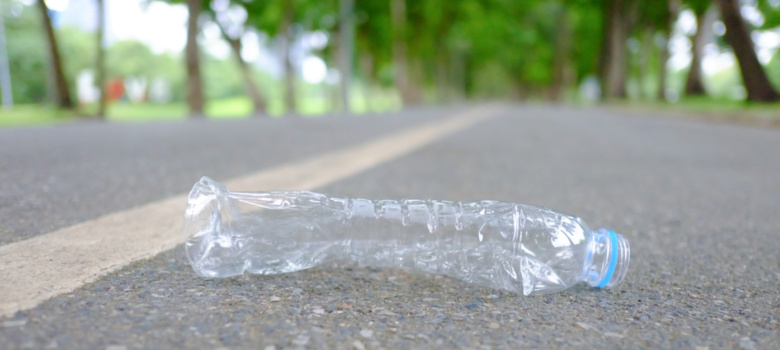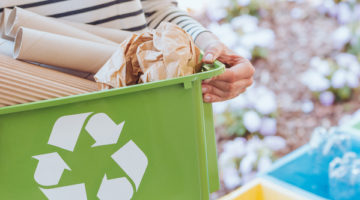
County Councils across the UK, the most recent being Enfield, have started a new recycling scheme to tackle the amount of plastic bottle waste that goes into landfill. The scheme entails recycling plastic bottles in order to use them as part of the tarmac mixture for road surfacing.
As we know, when plastic reaches our seas and oceans, it can have a devastating impact on our environment. We have recently seen images in the media of divers swimming in a sea of plastic bottles and waste. Most plastic bottles for water and soft drinks are made from a highly recyclable material called polyethylene terephthalate, therefore the level of waste build up within the seas and oceans is inexcusable. However, with the rate of plastic usage in the UK rising, efforts to recycle are struggling to keep up.
Plastic roads – where did it all begin?
The use of plastic in road surfaces was initially started by a company called MacRebur, who were the Virgin Media Business Voom Start-up winner of 2016, earning a cool £1million investment from Richard Branson. The company are driven by environmentally sustainable ethics, with the key aims of utilising the millions of tons of plastic waste that sits in our landfill sites at the same time as reducing the millions of taxpayer pounds spent on road maintenance and repairs, and making our roads even stronger with the use of plastic substitutes.
MacRebur claim that their plastic roads provide a solution to pothole repairs. Potholes pose the threat of dangerous road conditions and driving, with the costly method of using bitumen and asphalt (expensive materials!) to repair them. The plastic road solution is meant to be a far longer lasting and cost effective method of road maintenance and repair.
The company produces three plastic substitute products: MR6, MR8 and MR10, which are all available in flake or pellet form as a means of mixing into asphalt. The structural benefits of using plastic substitute products include; higher tensile strength, improved rheology, cohesion and adhesion, fuel resistance and resistance to cracking and fatigue failures. In layman’s terms it’s high performance and super effective. The concerted efforts of Enfield Council and other county councils around the country will hopefully pave the way for more local councils to follow their example.
How is the plastic used to make road surfaces?
The process of recycling plastic for road surfaces involves making plastic pellets which are then melted into an asphalt mix (bitumen, plastic, sand, gravel, etc.), which is then used for the road surface. So essentially, instead of going into landfill, plastic waste is going towards reducing our dependence upon fossil fuels.
This is a really clever way of recycling and is in effect killing two birds with one stone, because the plastic element of the tarmac mixture means that it is stronger and less likely to flake apart – which is what happens when potholes are formed. These days, Councils have less and less money to spend on repairing road surfaces, therefore this new method of construction can only serve to help improve this by making roads more hard-wearing and contributing towards recycling efforts.
Bitumen is a key component of our road surfaces and comes from fossil fuels; it is black and viscous, originating from petroleum residues or hydrocarbons (yes, our dependence upon fossil fuels extends to the roads upon which we drive our fossil fuel-powered cars!). Part of the process of making plastic roads involves replacing some of the expensive bitumen and asphalt in the mixture with the recycled plastic pellets – therefore potentially saving councils money in the long run, since the cost of the bitumen is dependent upon oil prices.
Plastic roads in Cumbria
Cumbria county council were to first to undertake a venture trialling recycled plastic for road surfaces. The £200,000 project involved using the equivalent of 500,000 plastic bottles to make the new road surface on the A7 in the Lake District. The council are said to be really happy with the success of the project and are keen to look into furthering their use of recycled plastic for similar projects in the future.
This is clearly a very exciting new venture, however as with anything there are doubts and potential downsides…
What are the downsides to using plastic in road surfaces?
Because it’s still a new concept, the long term effects or consequences of using plastic in our roads have not been fully established. There are however some concerns about the the fact that there is no evidence that the plastics are chemically inert. Therefore, could the degradation process of the plastics leach toxic substances or noxious gases further down the line? And once the plastic road surfaces have reached the end of their life span, how will they be safely disposed of?
Only time will tell, but for now we are impressed with the initiative!












This is a no-brainer; what are we waiting for?
What’s the toxic impact on humans down the road? Sounds like the next chapter of nuclear waste. Pavers will be the next coal miners, with afflictions of indeterminate origin . . . It took over 40 years for someone to finally nail Monsanto on the damage done by Roundup, despite the Obama administration’s attempt to protect them. Wonder what will be the next Attention Deficit Disorder, Cancer, or disability the government will have to help with . . . .
As a National Car Park operator in the UK serving local authorities, railways and NHS, we would be very interested in considering a trial of the recycled plastic surface, I look forward to receiving further information on the product.
The initiative by County Councils in the UK, like Enfield, to recycle plastic bottles for road surfacing is a commendable step toward combating plastic waste and promoting sustainable infrastructure. Repurposing plastic bottles in tarmac not only diverts these materials from landfills but also contributes to creating more durable and eco-friendly roads. Such innovative recycling methods showcase the potential for transforming waste materials into valuable resources, offering a tangible solution to reduce environmental impact. This forward-thinking approach highlights the importance of exploring diverse recycling techniques, like those evident in diaper recycling equipment (https://diaperrecycling.technology/equipment/), which demonstrate the possibilities of repurposing various waste materials, contributing to a more sustainable and greener future for our communities.